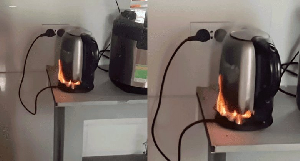
Using an electric kettle to boil water is a common practice in many households. However, a staggering 9 out of 10 households make a critical mistake when using their electric kettle.
The mistake is not just a minor oversight, but rather a habit that can have serious consequences on the longevity of the electric kettle and even the health of the users. So, what is this mistake that so many households are making?
One of the primary mistakes is choosing the wrong type of electric kettle. Many households opt for kettles made of low-quality materials that can leach chemicals into the water. Instead, households should choose electric kettles made of 304 stainless steel, which is resistant to corrosion and can withstand high temperatures.
Another mistake is pouring too much water into the electric kettle. This can cause the water to overflow and potentially damage the device. Households should leave enough space in the kettle to avoid this.
A third mistake is turning on the kettle before adding water. This can cause damage to the device and potentially lead to a fire hazard. Instead, households should pour water into the kettle before turning it on.
A fourth mistake is pouring out all the water after boiling. This can dry out the thermal relay, affecting the life of the kettle. Instead, households should leave some water inside the kettle.
A fifth mistake is rarely cleaning the electric kettle. This can lead to the buildup of yellow scales, which can affect the quality of the water and be harmful to human health. Households should regularly clean their electric kettles with vinegar to remove dirt and residue.
In addition to these mistakes, households should also be aware of the importance of descaling their electric kettles regularly. This can help prevent the buildup of mineral deposits, which can affect the performance of the kettle.
By being aware of these common mistakes and taking steps to avoid them, households can help extend the life of their electric kettle and ensure that their water is safe and healthy to drink.
In conclusion, using an electric kettle to boil water is a common practice, but many households are making critical mistakes that can have serious consequences. By choosing the right type of electric kettle, pouring the right amount of water, turning on the kettle safely, leaving some water inside, cleaning the kettle regularly, and descaling the kettle, households can help ensure that their electric kettle lasts longer and their water is safe and healthy to drink.